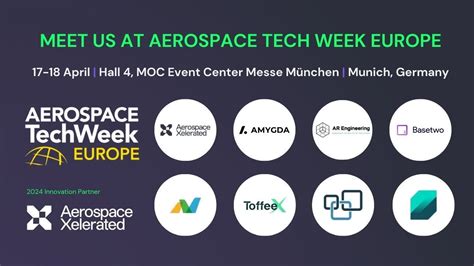The aerospace industry is constantly evolving, driven by advancements in technology, changing market demands, and the need for sustainability. Aerospace Tech Week Europe, a premier event for the aerospace industry, brings together experts, innovators, and professionals to share insights, showcase cutting-edge technologies, and discuss the future of aerospace. This year's event was particularly notable, offering a wealth of information and inspiration for attendees. Here are five key takeaways from Aerospace Tech Week Europe:
Advancements in Sustainability and Environmental Impact

One of the most significant themes at Aerospace Tech Week Europe was the focus on sustainability and reducing the environmental impact of the aerospace industry. Speakers and exhibitors highlighted various initiatives and technologies aimed at making air travel more environmentally friendly. This includes the development of electric and hybrid-electric propulsion systems, more efficient engine designs, and the use of sustainable aviation fuels (SAF). The emphasis on sustainability reflects the industry's commitment to reducing carbon emissions and meeting the challenges posed by climate change.
Artificial Intelligence and Machine Learning in Aerospace

Artificial intelligence (AI) and machine learning (ML) are transforming the aerospace industry in various ways. From predictive maintenance to optimized flight routes, AI and ML are being used to improve efficiency, safety, and the passenger experience. Aerospace Tech Week Europe featured numerous sessions and exhibits on AI and ML applications, including the use of these technologies in aircraft design, manufacturing, and operations. As the industry continues to adopt AI and ML, we can expect to see significant improvements in performance and reductions in costs.
Electrification and Hybrid-Electric Propulsion

Electrification and hybrid-electric propulsion were among the most talked-about topics at Aerospace Tech Week Europe. Several companies showcased their electric and hybrid-electric propulsion systems, highlighting the potential for these technologies to reduce emissions and operating costs. While there are still significant technical challenges to overcome, the interest in electrification reflects the industry's commitment to finding more sustainable solutions for the future of air travel.
Advancements in Materials Science and Manufacturing

The aerospace industry is constantly seeking new materials and manufacturing techniques to improve performance, reduce weight, and lower costs. Aerospace Tech Week Europe featured numerous presentations and exhibits on advancements in materials science and manufacturing, including the use of composite materials, 3D printing, and advanced alloys. These technologies are enabling the creation of lighter, stronger, and more efficient aircraft, which will play a critical role in the industry's sustainability efforts.
Connectivity and the Future of Air Travel

Finally, Aerospace Tech Week Europe highlighted the importance of connectivity in the future of air travel. With the increasing demand for in-flight connectivity, airlines and aircraft manufacturers are investing heavily in technologies that provide fast, reliable, and secure internet access. This not only enhances the passenger experience but also enables a range of new applications and services, from real-time aircraft health monitoring to personalized entertainment.
Gallery of Aerospace Innovations






The future of the aerospace industry is exciting and rapidly evolving. As we continue to push the boundaries of innovation, we can expect to see significant advancements in sustainability, electrification, materials science, manufacturing, and connectivity. Aerospace Tech Week Europe provided a valuable insight into these developments and the opportunities they present for the industry.
What is the primary focus of the aerospace industry in terms of sustainability?
+The aerospace industry is primarily focused on reducing carbon emissions and environmental impact through the development of sustainable aviation fuels (SAF), electric and hybrid-electric propulsion systems, and more efficient engine designs.
What role does artificial intelligence play in the aerospace industry?
+Artificial intelligence (AI) and machine learning (ML) are being used in various applications in the aerospace industry, including predictive maintenance, optimized flight routes, and enhanced passenger experience.
What are the benefits of electrification and hybrid-electric propulsion in aerospace?
+Electrification and hybrid-electric propulsion offer the potential to reduce emissions and operating costs, while also improving efficiency and performance.
As the aerospace industry continues to evolve, we can expect to see significant advancements in these areas and more. By embracing innovation and sustainability, the industry can create a brighter future for air travel and beyond.
